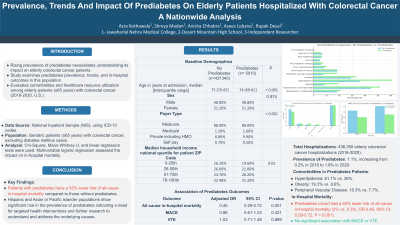Sunday Poster Session
Category: Colon
P0248 - Prevalence, Trends And Impact Of Prediabetes On Elderly Patients Hospitalized With Colorectal Cancer - A Nationwide Analysis
Sunday, October 27, 2024
3:30 PM - 7:00 PM ET
Location: Exhibit Hall E

Has Audio

Azra Kothawala, MBBS
Jawaharlal Nehru Medical College
Belgaum, Karnataka, India
Presenting Author(s)
Azra Kothawala, MBBS1, Shreya Madan, 2, Anisha Chhabra, 2, Asees Lubana, 2, Rupak Desai, MBBS3
1Jawaharlal Nehru Medical College, Belgaum, Karnataka, India; 2Desert Mountain High School, Scottsdale, AZ; 3Outcomes Research, Atlanta, GA
Introduction: Given the rising prevalence of prediabetes and its potential impact on health outcomes, it is crucial to understand its implications for elderly patients hospitalized with colorectal cancer. Our study aims to examine the role of prediabetes in this population by studying its prevalence, trends, and impact on in-hospital outcomes, as well as evaluate comorbidities and healthcare resource utilization among elderly patients hospitalized with colorectal cancer (CRC) from 2016 to 2020 in the United States.
Methods: We used the National Inpatient Sample (NIS) with relevant ICD-10 codes to identify all elderly patients ( >=65 years) hospitalized between 2016 and 2020 with CRC and prediabetes, excluding cases with diabetes mellitus. We used the Chi Square test for categorical data, the Mann-Whitney U test for continuous data, and the linear by linear association test for trend analysis. We used multivariable logistic regression to assess the association between prediabetes and in-hospital outcomes. Statistical significance was defined by a p-value < 0.05.
Results: There were 436,350 geriatric hospitalizations with CRC between 2016 and 2020, of which 1.1% had prediabetes. The overall prevalence of prediabetes in elderly patients hospitalized with CRC increased from 2016 to 2020 (0.2% to 1.8%), with a particularly notable increase among Hispanic (2.5% to 2.8%) and Asian or Pacific Islander populations (3.3% to 4.6%), P< 0.001. The burden of comorbidities, particularly hyperlipidemia (61.1% vs. 36%), obesity (19.3% vs. 8.6%), and peripheral vascular disease (18.3% vs. 7.7%), was higher in the prediabetes cohort. Patients with prediabetes had a significantly lower risk of all-cause in-hospital mortality compared to those without prediabetes (2% vs. 5.3%, OR 0.45, 95% CI: 0.29-0.72, P-0.001). We observed no significant association in the likelihood of MACE or VTE.
Discussion: Among geriatric patients hospitalized with CRC, those with prediabetes have a 55% lower risk of all-cause in-hospital mortality compared to those without prediabetes. We need to conduct further research to comprehend the underlying mechanisms of the observed reduced risk and investigate the potential protective effects of specific prediabetes-associated factors. Hispanic and Asian/Pacific Islander populations show a significant rise in prediabetes prevalence, indicating a need for targeted health interventions and further research to understand and address the underlying causes.
Note: The table for this abstract can be viewed in the ePoster Gallery section of the ACG 2024 ePoster Site or in The American Journal of Gastroenterology's abstract supplement issue, both of which will be available starting October 27, 2024.
Disclosures:
Azra Kothawala, MBBS1, Shreya Madan, 2, Anisha Chhabra, 2, Asees Lubana, 2, Rupak Desai, MBBS3. P0248 - Prevalence, Trends And Impact Of Prediabetes On Elderly Patients Hospitalized With Colorectal Cancer - A Nationwide Analysis, ACG 2024 Annual Scientific Meeting Abstracts. Philadelphia, PA: American College of Gastroenterology.
1Jawaharlal Nehru Medical College, Belgaum, Karnataka, India; 2Desert Mountain High School, Scottsdale, AZ; 3Outcomes Research, Atlanta, GA
Introduction: Given the rising prevalence of prediabetes and its potential impact on health outcomes, it is crucial to understand its implications for elderly patients hospitalized with colorectal cancer. Our study aims to examine the role of prediabetes in this population by studying its prevalence, trends, and impact on in-hospital outcomes, as well as evaluate comorbidities and healthcare resource utilization among elderly patients hospitalized with colorectal cancer (CRC) from 2016 to 2020 in the United States.
Methods: We used the National Inpatient Sample (NIS) with relevant ICD-10 codes to identify all elderly patients ( >=65 years) hospitalized between 2016 and 2020 with CRC and prediabetes, excluding cases with diabetes mellitus. We used the Chi Square test for categorical data, the Mann-Whitney U test for continuous data, and the linear by linear association test for trend analysis. We used multivariable logistic regression to assess the association between prediabetes and in-hospital outcomes. Statistical significance was defined by a p-value < 0.05.
Results: There were 436,350 geriatric hospitalizations with CRC between 2016 and 2020, of which 1.1% had prediabetes. The overall prevalence of prediabetes in elderly patients hospitalized with CRC increased from 2016 to 2020 (0.2% to 1.8%), with a particularly notable increase among Hispanic (2.5% to 2.8%) and Asian or Pacific Islander populations (3.3% to 4.6%), P< 0.001. The burden of comorbidities, particularly hyperlipidemia (61.1% vs. 36%), obesity (19.3% vs. 8.6%), and peripheral vascular disease (18.3% vs. 7.7%), was higher in the prediabetes cohort. Patients with prediabetes had a significantly lower risk of all-cause in-hospital mortality compared to those without prediabetes (2% vs. 5.3%, OR 0.45, 95% CI: 0.29-0.72, P-0.001). We observed no significant association in the likelihood of MACE or VTE.
Discussion: Among geriatric patients hospitalized with CRC, those with prediabetes have a 55% lower risk of all-cause in-hospital mortality compared to those without prediabetes. We need to conduct further research to comprehend the underlying mechanisms of the observed reduced risk and investigate the potential protective effects of specific prediabetes-associated factors. Hispanic and Asian/Pacific Islander populations show a significant rise in prediabetes prevalence, indicating a need for targeted health interventions and further research to understand and address the underlying causes.
Note: The table for this abstract can be viewed in the ePoster Gallery section of the ACG 2024 ePoster Site or in The American Journal of Gastroenterology's abstract supplement issue, both of which will be available starting October 27, 2024.
Disclosures:
Azra Kothawala indicated no relevant financial relationships.
Shreya Madan indicated no relevant financial relationships.
Anisha Chhabra indicated no relevant financial relationships.
Asees Lubana indicated no relevant financial relationships.
Rupak Desai indicated no relevant financial relationships.
Azra Kothawala, MBBS1, Shreya Madan, 2, Anisha Chhabra, 2, Asees Lubana, 2, Rupak Desai, MBBS3. P0248 - Prevalence, Trends And Impact Of Prediabetes On Elderly Patients Hospitalized With Colorectal Cancer - A Nationwide Analysis, ACG 2024 Annual Scientific Meeting Abstracts. Philadelphia, PA: American College of Gastroenterology.
